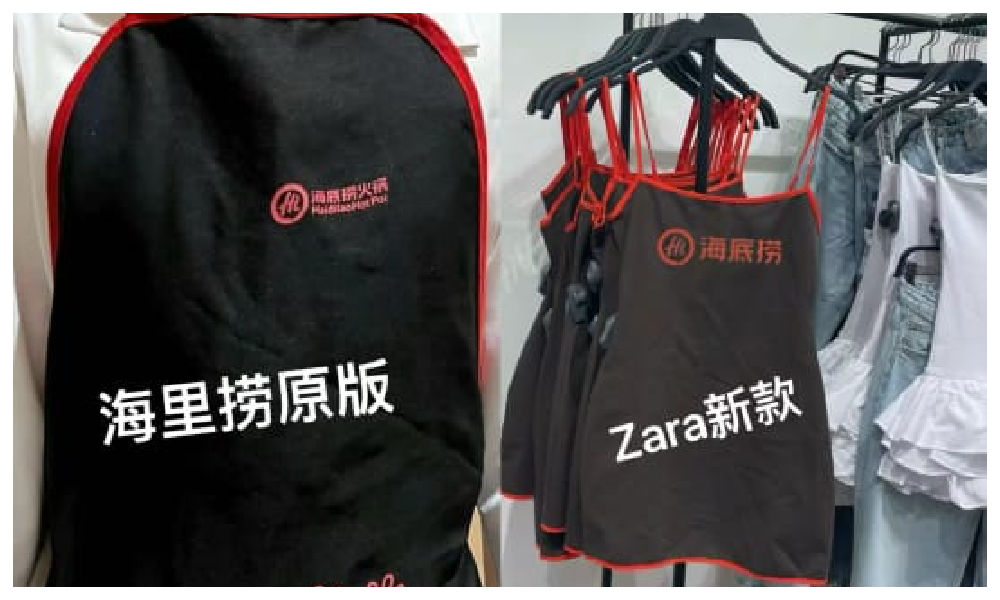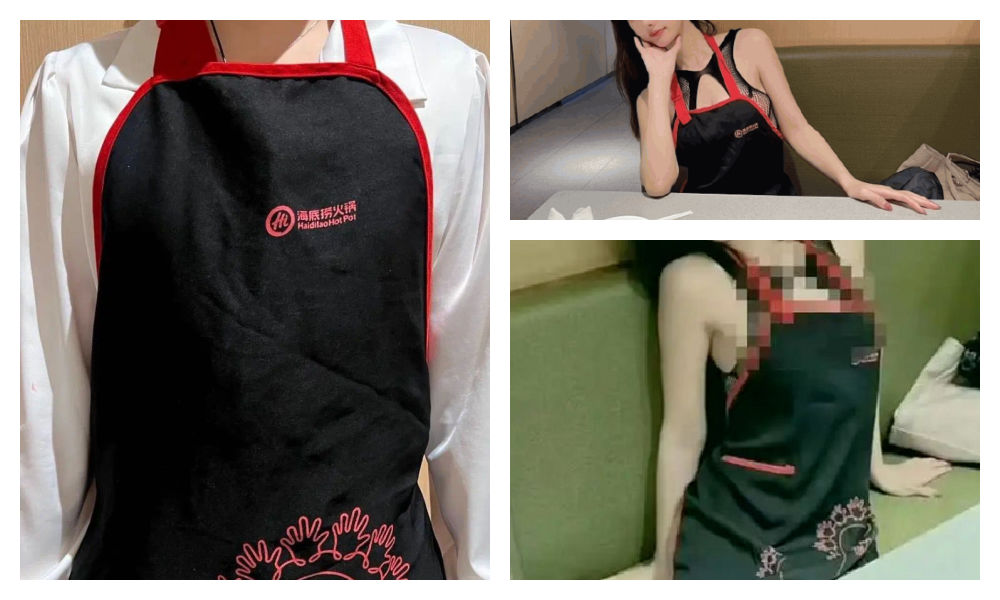China Memes & Viral
Chengdu Disney: The Quirkiest Hotspot in China
How a senior activity park in Chengdu was ‘Disneyfied’ and became a viral hotspot.
Published
1 month agoon

How did a common park turn into a buzzing hotspot? By mixing online trends with real-life fun, blending foreign styles with local charm, and adding a dash of humor and absurdity, Chengdu now boasts its very own ‘Chengdu Disney’. We explain the trend.
– By Manya Koetse, co-authored by Ruixin Zhang
Have you heard about Chengdu Disney yet? If not, it’s probably unlike anything you’d imagine. It’s not actually a Disney theme park opening up in Chengdu, but it’s one of the city’s most viral hotspots these days.
What is now known as ‘Chengdu Disney’ all over the Chinese internet is actually a small outdoor park in a residential area in Chengdu’s Yulin area, which also serves as the local senior fitness activity center.
Crowds of young people are coming to this area to take photos and videos, hang out, sing songs, cosplay, and be part of China’s internet culture in an offline setting.
Once Upon a Rap Talent Show
The roots of ‘Chengdu Disney’ can be traced back to the Chinese hip-hop talent show The Rap of China (中国新说唱), where a performer named Nuomi (诺米), also known as Lodmemo, was eliminated by Chinese rapper Boss Shady (谢帝 Xièdì), one of the judges on the show.
Nuomi felt upset about the elimination and a comment made by his idol mentor, who mistakenly referred to a song Nuomi made for his ‘grandma’ instead of his grandfather. His frustration led to a viral livestream where he expressed his anger towards his participation in The Rap of China and Boss Shady.
However, it wasn’t only his anger that caught attention; it was his exaggerated way of speaking and mannerisms. Nuomi, with his Sichuan accent, repeatedly inserted English phrases like “y’know what I’m saying” and gestured as if throwing punches.
His oversized silver chain, sagging pants, and urban streetwear only reinforce the idea that Nuomi is trying a bit too hard to emulate the fashion style of American rappers from the early 2000s, complete with swagger and street credibility.

Lodmemo emulates the style of American rappers in the early 2000s, and he has made it his brand.
Although people mocked him for his wannabe ‘gangsta’ style, Nuomi embraced the teasing and turned it into an opportunity for fame.
He decided to create a diss track titled Xiè Tiān Xièdì 谢天谢帝, “Thank Heaven, Thank Emperor,” a word joke on Boss Shady’s name, which sounds like “Shady” but literally means ‘Thank the Emperor’ in Chinese. A diss track is a hip hop or rap song intended to mock someone else, usually a fellow musician.
In the song, when Nuomi disses Boss Shady (谢帝 Xièdì), he raps in Sichuan accent: “Xièdì Xièdì wǒ yào diss nǐ [谢帝谢帝我要diss你].” The last two words, namely “diss nǐ” actually means “to diss you” but sounds exactly like the Chinese word for ‘Disney’: Díshìní (迪士尼). This was soon picked up by netizens, who found humor in the similarity; it sounded as if the ‘tough’ rapper Nuomi was singing about wanting to go to Disney.

Nuomi and his diss track, from the music video.
Nuomi filmed the music video for this diss track at a senior activity park in Chengdu’s Yulin subdistrict. The music video went viral in late March, and led to the park being nicknamed the ‘Chengdu Disney.’
The particular exercise machine on which Nuomi performed his rap quickly became an iconic landmark on Douyin, as everyone eagerly sought to visit, sit on the same see-saw-style exercise machine, and repeat the phrase, mimicking the viral video.

What began as a homonym led to people ‘Disneyfying’ the park itself, with crowds of visitors flocking to the park, some dressed in Disney-related costumes.

This further developed the concept of a Chengdu ‘Disney’ destination, turning the park playground into the happiest place in Yulin.
Chengdu: China’s Most Relaxed Hip Hop Hotspot
Chengdu holds a special place in China’s underground hip-hop scene, thanks to its vibrant music culture and the presence of many renowned Chinese hip-hop artists who incorporate the Sichuan dialect into their songs and raps.
This is one reason why this ‘Disney’ meme happened in Chengdu and not in any other Chinese city. But beyond its musical significance, the playful spirit of the meme also aligns with Chengdu’s reputation for being an incredibly laid-back city.
In recent years, the pursuit of a certain “relaxed feeling” (sōngchígǎn 松弛感) has gained popularity across the Chinese internet. Sōngchígǎn is a combination of the word for “relaxed,” “loose” or “lax” (松弛) and the word for “feeling” (感). Initially used to describe a particular female aesthetic, the term evolved to represent a lifestyle where individuals strive to maintain a relaxed demeanor, especially in the face of stressful situations.
🌟 Attention!
For 11 years, What’s on Weibo has remained a 100% independent blog, fueled by my passion to write about China’s digital culture and online trends. Over a year ago, we introduced a soft paywall to ensure the sustainability of this platform. I’m grateful to all our loyal readers who’ve subscribed since 2022. Your support has been invaluable. But we need more subscribers to continue our work. If you appreciate our content and want to support independent China reporting, please consider becoming a subscriber. Your support keeps What’s on Weibo going strong!
The concept gained traction online in mid-2022 when a Weibo user shared a story of a family remaining composed when their travel plans were unexpectedly disrupted due to passport issues. Their calm and collected response inspired the adoption of the “relaxed feeling” term (also read here).
Central to embodying this sense of relaxation is being unfazed by others’ opinions and avoiding unnecessary stress or haste out of fear of judgment.
Nowadays, Chinese cities aim to foster this sense of sōngchígǎn. Not too long ago, there were many hot topics suggesting that Chengdu is the most sōngchí 松弛, the most relaxed city in China.
This sentiment is reflected in the ‘Chengdu Disney’ trend, which both pokes fun at a certain hip-hop aesthetic deemed overly relaxed—like the guys who showed up with sagging pants—and embraces a carefree, childlike silliness that resonates with the city’s character and its people.

Mocking sagging pants at ‘Chengdu Disney.’
Despite the influx of visitors to the Chengdu Disney area, authorities have not yet significantly intervened. Community notices urging respect for nearby residents and the presence of police officers to maintain order indicate a relatively hands-off approach. For now, it seems most people are simply enjoying the relaxed atmosphere.
Being Part of the Meme
An important aspect that contributes to the appeal of Chengdu Disney is its nature as an online meme, allowing people to actively participate in it.

Scenes from Chengdu Disney, images via Weibo.
China has a very strong meme culture. Although there are all kinds of memes, from visual to verbal, many Chinese memes incorporate wordplay. In part, this has to do with the nature of Chinese language, as it offers various opportunities for puns, homophones, and linguistic creativity thanks to its tones and characters.
The use of homophones on Chinese social media is as old as Chinese social media itself. One of the most famous examples is the phrase ‘cǎo ní mǎ’ (草泥马), which literally means ‘grass mud horse’, but is pronounced in the same way as the vulgar “f*ck your mother” (which is written with three different characters).
In the case of the Chengdu Disney trend, it combines a verbal meme—stemming from the ‘diss nǐ’ / Díshìní homophone—and a visual meme, where people gather to pose for videos/photos in the same location, repeating the same phrase.
Moreover, the trend bridges the gap between the online and offline worlds, as people come together at the Chengdu playground, forming a tangible community through digital culture.
The fact that this is happening at a residential exercise park for the elderly adds to the humor: it’s a Chengdu take on what “urban” truly means. These colorful exercise machines are a common sight in Chinese parks nationwide and are actually very mundane. Transforming something so normal into something extraordinary is part of the meme.

A 3D-printed model version of the exercise equipment featured in Nuomi’s music video.
Lastly, the incorporation of the Disney element adds a touch of whimsy to the trend. By introducing characters like Snow White and Mickey Mouse, the trend blends American influences (hip-hop, Disney) with local Chengdu culture, creating a captivating and absurd backdrop for a viral phenomenon.
For some people, the pace in which these trends develop is just too quick. On Weibo, one popular tourism blogger (@吴必虎) wrote: “The viral hotspots are truly unpredictable these days. We’re still seeing buzz around the spicy hot pot in Gansu’s Tianshui, meanwhile, a small seesaw originally meant for the elderly in a residential community suddenly turns into “Chengdu Disneyland,” catching the cultural and tourism authorities of Sichuan and even Shanghai Disneyland off guard. Netizens are truly powerful, even making it difficult for me, as a professional cultural tourism researcher, to keep up with them.”
By Manya Koetse, co-authored by Ruixin Zhang
Independently reporting China trends for over a decade. Like what we do? Support us and get the story behind the hashtag by subscribing:
Spotted a mistake or want to add something? Please let us know in comments below or email us. First-time commenters, please be patient – we will have to manually approve your comment before it appears.
©2024 Whatsonweibo. All rights reserved. Do not reproduce our content without permission – you can contact us at info@whatsonweibo.com.
Manya Koetse is the founder and editor-in-chief of whatsonweibo.com. She is a writer, public speaker, and researcher (Sinologist, MPhil) on social trends, digital developments, and new media in an ever-changing China, with a focus on Chinese society, pop culture, and gender issues. She shares her love for hotpot on hotpotambassador.com. Contact at manya@whatsonweibo.com, or follow on Twitter.

Also Read
China Insight
The Tragic Story of “Fat Cat”: How a Chinese Gamer’s Suicide Went Viral
The story of ‘Fat Cat’ has become a hot topic in China, sparking widespread sympathy and discussions online.
Published
7 days agoon
May 9, 2024
The tragic story behind the recent suicide of a 21-year-old Chinese gamer nicknamed ‘Fat Cat’ has become a major topic of discussion on Chinese social media, touching upon broader societal issues from unfair gender dynamics to businesses taking advantage of grieving internet users.
The story of a 21-year-old Chinese gamer from Hunan who committed suicide has gone completely viral on Weibo and beyond this week, generating many discussions.
In late April of this year, the young man nicknamed ‘Fat Cat’ (胖猫 Pàng Māo, literally fat or chubby cat), tragically ended his life by jumping into the river near the Chongqing Yangtze River Bridge (重庆长江大桥) following a breakup with his girlfriend. By now, the incident has come to be known as the “Fat Cat Jumping Into the River Incident” (胖猫跳江事件).
News of his suicide soon made its rounds on the internet, and some bloggers started looking into what was behind the story. The man’s sister also spoke out through online channels, and numerous chat records between the young man and his girlfriend emerged online.
One aspect of his story that gained traction in early May is the revelation that the man had invested all his resources into the relationship. Allegedly, he made significant financial sacrifices, giving his girlfriend over 510,000 RMB (approximately 71,000 USD) throughout their relationship, in a time frame of two years.
When his girlfriend ended the relationship, despite all of his efforts, he was devastated and took his own life.
The story was picked up by various Chinese media outlets, and prominent social and political commentator Hu Xijin also wrote a post about Fat Cat, stating the sad story had made him tear up.
As the news spread, it sparked a multitude of hashtags on Weibo, with thousands of netizens pouring out their thoughts and emotions in response to the story.
Playing Games for Love
The main part of this story that is triggering online discussions is how ‘Fat Cat,’ a young man who possessed virtually nothing, managed to provide his girlfriend, who was six years older, with such a significant amount of money – and why he was willing to sacrifice so much in order to do so.
The young man reportedly was able to make money by playing video games, specifically by being a so-called ‘booster’ by playing with others and helping them get to a higher level in multiplayer online battle games.
According to his sister, he started working as a ‘professional’ video gamer as a means of generating money to satisfy his girlfriend, who allegedly always demanded more.
He registered a total of 36 accounts to receive orders to play online games, making 20 yuan per game (about $2.80). Because this consumed all of his time, he barely went out anymore and his social life was dead.
In order to save more money, he tried to keep his own expenses as low as possible, and would only get takeout food for himself for no more than 10 yuan ($1,4). His online avatar was an image of a cat saying “I don’t want to eat vegetables, I want to eat McDonald’s.”

The woman in question who he made so many sacrifices for is named Tan Zhu (谭竹), and she soon became the topic of public scrutiny. In one screenshot of a chat conversation between Tan and her boyfriend that leaked online, she claimed she needed money for various things. The two had agreed to get married later in this year.
Despite of this, she still broke up with him, driving him to jump off the bridge after transferring his remaining 66,000 RMB (9135 USD) to Tan Zhu.
As the story fermented online, Tan Zhu also shared her side of the story. She claimed that she had met ‘Fat Cat’ over two years ago through online gaming and had started a long distance relationship with him. They had actually only met up twice before he moved to Chongqing. She emphasized that financial gain was never a motivating factor in their relationship.
Tan additionally asserted that she had previously repaid 130,000 RMB (18,000 USD) to him and that they had reached a settlement agreement shortly before his tragic death.
Ordering Take-Out to Mourn Fat Cat
– “I hope you rest in peace.”
– “Little fat cat, I hope you’ll be less foolish in your next life.”
– “In your next life, love yourself first.”
These are just a few of the messages left by netizens on notes attached to takeout food deliveries near the Chongqing Yangtze River Bridge.
As Fat Cat’s story stirred up significant online discussion, with many expressing sympathy for the young man who rarely indulged in spending on food and drinks, some internet users took the step of ordering McDonalds and other food delivery services to the bridge, where he tragically jumped from, in his honor.
This soon snowballed into more people ordering food and drinks to the bridge, resulting in a constant flow of delivery staff and a pile-up of take-out bags.

Delivery food on the bridge, photo via Weibo.
However, as the food delivery efforts picked up pace, it came to light that some of the deliveries ordered and paid for were either empty or contained something different; certain restaurants, aware of the collective effort to honor the young man, deliberately left the food boxes empty or substituted sodas or tea with tap water.

At least five restaurants were caught not delivering the actual orders. Chinese bubble tea shop ChaPanda was exposed for substituting water for milk tea in their cups. On May 3rd, ChaPanda responded that they had fired the responsible employee.
Another store, the Zhu Xiaoxiao Luosifen (朱小小螺蛳粉), responded on that they had temporarily closed the shop in question to deal with the issue. Chinese fast food chain NewYobo (牛约堡) also acknowledged that at least twenty orders they received were incomplete.
Fast food company Wallace (华莱士) responded to the controversy by stating they had dismissed the employees involved. Mixue Ice Cream & Tea (蜜雪冰城) issued an apology and temporarily closed one of their stores implicated in delivering empty orders.
In the midst of all the controversy, Fat Cat’s sister asked internet users to refrain from ordering take-out food as a means of mourning and honoring her brother.
Nevertheless, take-out food and flowers continued to accumulate near the bridge, prompting local authorities to think of ways of how to deal with this unique method of honoring the deceased gamer.
Gamer Boy Meets Girl
On Chinese social media, this story has also become a topic of debate in the context of gender dynamics and social inequality.
There are some male bloggers who are angry with Tan Zhu, suggesting her behaviour is an example of everything that’s supposedly “wrong” with Chinese women in this day and age.
Others place blame on Fat Cat for believing that he could buy love and maintain a relationship through financial means. This irked some feminist bloggers, who see it as a chauvinistic attitude towards women.
A main, recurring idea in these discussions is that young Chinese men such as Fat Cat, who are at the low end of the social ladder, are actually particularly vulnerable in a fiercely competitive society. Here, a gender imbalance and surplus of unmarried men make it easier for women to potentially exploit those desperate for companionship.
The story of Fat Cat brings back memories of ‘Mo Cha Official,’ a not-so-famous blogger who gained posthumous fame in 2021 when details of his unhappy life surfaced online.
Likewise, the tragic tale of WePhone founder Su Xiangmao (苏享茂) resurfaces. In 2017, the 37-year-old IT entrepreneur from Beijing took his own life, leaving behind a note alleging blackmail by his 29-year-old ex-wife, who demanded 10 million RMB (±1.5 million USD) (read story).
Another aspect of this viral story that is mentioned by netizens is how it gained so much attention during the Chinese May holidays, coinciding with the tragic news of the southern China highway collapse in Guangdong. That major incident resulted in the deaths of at least 48 people, and triggered questions over road safety and flawed construction designs. Some speculate that the prominence given to the Fat Cat story on trending topic lists may have been a deliberate attempt to divert attention away from this incident.
‘Fat Cat’ was cremated. His family stated their intention to take necessary legal steps to recover the money from his former girlfriend, but Tan Zhu reportedly already reached an agreement with the father and settled the case. Nevertheless, the case continues to generate discussions online, with some people wondering: “Is it over yet? Can we talk about something different now?”

Fat Cat images projected in Times Square
However, given that images of the ‘Fat Cat’ avatar have even appeared in Times Square in New York by now (Chinese internet users projected it on one of the big LED screens), it’s likely that this story will be remembered and talked about for some time to come.
By Manya Koetse
– With contributions by Miranda Barnes and Ruixin Zhang
Independently reporting China trends for over a decade. Like what we do? Support us and get the story behind the hashtag by subscribing:
Spotted a mistake or want to add something? Please let us know in comments below or email us. First-time commenters, please be patient – we will have to manually approve your comment before it appears.
©2024 Whatsonweibo. All rights reserved. Do not reproduce our content without permission – you can contact us at info@whatsonweibo.com.
China Brands, Marketing & Consumers
Zara Dress Goes Viral in China for Resemblance to Haidilao Apron
Who’s gonna buy this Zara dress in China? “I’m afraid that someone will say I stole the apron from Haidilao.”
Published
4 weeks agoon
April 19, 2024
A short dress sold by Zara has gone viral in China for looking like the aprons used by the popular Chinese hotpot chain Haidilao.
“I really thought it was a Zara x Haidialo collab,” some customers commented. Others also agree that the first thing they thought about when seeing the Zara dress was the Haidilao apron.

The “original” vs the Zara dress.
The dress has become a popular topic on Xiaohongshu and other social media, where some images show the dress with the Haidilao logo photoshopped on it to emphasize the similarity.

One post on Xiaohongshu discussing the dress, with the caption “Curious about the inspiration behind Zara’s design,” garnered over 28,000 replies.
Haidilao, with its numerous restaurants across China, is renowned for its hospitality and exceptional customer service. Anyone who has ever dined at their restaurants is familiar with the Haidilao apron provided to diners for protecting their clothes from food or oil stains while enjoying hotpot.
These aprons are meant for use during the meal and should be returned to the staff afterward, rather than taken home.

The Haidilao apron.
However, many people who have dined at Haidilao may have encountered the following scenario: after indulging in drinks and hotpot, they realize they are still wearing a Haidilao apron upon leaving the restaurant. Consequently, many hotpot enthusiasts may have an ‘accidental’ Haidilao apron tucked away at home somewhere.
This only adds to the humor of the latest Zara dress looking like the apron. The similarity between the Zara dress and the Haidilao apron is actually so striking, that some people are afraid to be accused of being a thief if they would wear it.
One Weibo commenter wrote: “The most confusing item of this season from Zara has come out. It’s like a Zara x Haidilao collaboration apron… This… I can’t wear it: I’m afraid that someone will say I stole the apron from Haidilao.”

Funnily enough, the Haidilao apron similarity seems to have set off a trend of girls trying on the Zara dress and posting photos of themselves wearing it.

It’s doubtful that they’re actually purchasing the dress. Although some commenters say the dress is not bad, most people associate it too closely with the Haidilao brand: it just makes them hungry for hotpot.
By Manya Koetse
Independently reporting China trends for over a decade. Like what we do? Support us and get the story behind the hashtag by subscribing:
Spotted a mistake or want to add something? Please let us know in comments below or email us. First-time commenters, please be patient – we will have to manually approve your comment before it appears.
©2024 Whatsonweibo. All rights reserved. Do not reproduce our content without permission – you can contact us at info@whatsonweibo.com.
Subscribe

The Tragic Story of “Fat Cat”: How a Chinese Gamer’s Suicide Went Viral

A Brew of Controversy: Lu Xun and LELECHA’s ‘Smoky’ Oolong Tea

Weibo Watch: The Battle for the Bottom Bed

Zara Dress Goes Viral in China for Resemblance to Haidilao Apron

“Old Bull Eating Young Grass”: 86-Year-Old Chinese Painter Fan Zeng Marries 36-Year-Old Xu Meng

The Tragic Story of “Fat Cat”: How a Chinese Gamer’s Suicide Went Viral

The Chinese Viral TikTok Song Explained (No, It’s Not About Samsung)

The ‘Two Sessions’ Suggestions: Six Proposals Raising Online Discussions

“Old Bull Eating Young Grass”: 86-Year-Old Chinese Painter Fan Zeng Marries 36-Year-Old Xu Meng

Top 9 Chinese Movies to Watch This Spring Festival Holiday

More than Malatang: Tianshui’s Recipe for Success

Party Slogan, Weibo Hashtag: “The Next China Will Still Be China”

A Brew of Controversy: Lu Xun and LELECHA’s ‘Smoky’ Oolong Tea

From Pitch to Politics: About the Messy Messi Affair in Hong Kong (Updated)

Chengdu Disney: The Quirkiest Hotspot in China
Get in touch
Would you like to become a contributor, or do you have any tips or suggestions? Get in touch here!
Popular Reads
-

 China Insight7 days ago
China Insight7 days agoThe Tragic Story of “Fat Cat”: How a Chinese Gamer’s Suicide Went Viral
-

 China Music2 months ago
China Music2 months agoThe Chinese Viral TikTok Song Explained (No, It’s Not About Samsung)
-

 China Insight2 months ago
China Insight2 months agoThe ‘Two Sessions’ Suggestions: Six Proposals Raising Online Discussions
-

 China Arts & Entertainment4 weeks ago
China Arts & Entertainment4 weeks ago“Old Bull Eating Young Grass”: 86-Year-Old Chinese Painter Fan Zeng Marries 36-Year-Old Xu Meng



